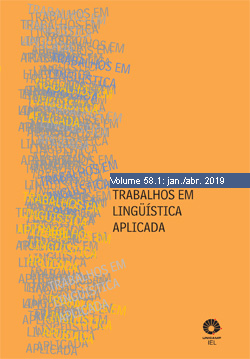Resumo
This interview with Prof. Dr. Brian Morgan from York University presents some of Dr. Morgan and Dr. Ferraz’s perspectives in relation to language education in Canada and Brazil. The conversation plunges into essential topics to be problematized by language educators from both countries: neoconservative politics, neoliberalism, plurilingualism, philosophy of language (Derrida, Bakhtin, Foucault, Deleuze), cultural studies, teacher education, teaching practices. Brian Morgan invites us to go through a process of further thinking in terms of: 1. The Neoliberal agenda within educational policies and actions, 2. The relationship between theories (philosophies of language, cultural studies) and practices (how such theories impact – or not – public teachers’ pedagogical practices), 3. The design of pedagogical projects (e.g., the Get Involved Project, MONTE MOR; MORGAN, 2014) that provide critical spaces for working within and against neoliberal agendas.Referências
APPLE, M. (2004). Creating Difference: Neo-Liberalism, Neo-Conservatism and the Politics of Educational Reform. Educational Policy, vol. 18, issue 12, p. 12-44.
BARBARA, V. (2019, JANUARY 16). I Put My Baby Daughter in Dinosaur Overalls. Am I an Anarchist? Tales of gender blasphemy from deep within the land of princes and princesses. Retrieved from the New York Times [on-line].
https://www.nytimes.com/2019/01/16/opinion/brazil-gender-alves.html
BRASIL (2006). Ministério da Educação, Secretaria de Educação Básica. Orientações curriculares para o ensino médio: linguagens, códigos e suas tecnologias / Secretaria de Educação Básica. v.1, Brasília. 239 p.
CHUN, C. (2015). The discourses of capitalism: Everyday Economics and the Production of Common Sense. London and New York: Routledge.
CHUN, C.; MORGAN, B. (2019). Critical research in English language teaching. Springer Second Handbook of English Language Teaching, in press.
FERRAZ, D. M.; KAWACHI, C. J. (Orgs.). Bate-Papo com educadores linguísticos: Letramentos, Formação docente e Criticidade/ Chatting with language educadors: Literacies, teacher education, and critique. Campinas: Pontes Editores, 2019, in press.
FLEMING, D.; MORGAN, B. (2011). Discordant Anthems: ESL and Critical Citizenship Education. Citizenship Education Research Network (CERN) Collection, p. 1-14.
FOUCAULT, M The History of Sexuality Vol. 3: The Care of the Self by Michel Foucault (1988, Paperback).
LUKE, A. (2004). Two takes on the critical. In B. Norton & K. Toohey (Eds.), Critical
pedagogies and language learning. Cambridge: Cambridge University Press, p. 21-29.
LUKE, A. (2013). Regrounding critical literacy: Representation, facts and reality. In M. R. Hawkins (Ed.), Framing language and literacies: Socially situated views and perspectives. New York: Routledge, p. 136-148.
McPHERRON, P.; RANDOLPH, P. T. (2013). Thinking like researchers: An ESL project that investigates local communities. TESOL Journal, 4(2), p. 312-331.
MENEZES DE SOUZA, L. M. T. (2004). The Ecology of Writing among the Kashinawa: indigenous multimodality in Brazil. In: CANAGARAJAH,S. (Ed.). Reclaiming the Local in Language Policy and Practice, p. 73-95.
MONTE MÓR, W.; MORGAN, B. (2014). Between conformity and critique. Teaching volunteerism, ‘activism’ and active citizenship: Dangerous pedagogies? Interfaces Brasil-Canadá [Special Issue], 14 (2), p. 16-35.
MORGAN, B. (2002). Critical practice in community-based ESL programs: A Canadian perspective. Journal of Language, Identity, and Education, 1, p. 141-162.
MORGAN, B. (2004). Modals and memories: A grammar lesson on the Quebec referendum on sovereignty. In B. Norton & K. Toohey (Eds.), Critical pedagogies and language learning. Cambridge: Cambridge University Press, p. 158-178.
MORGAN, B. (2016). Language teacher identity and the domestication of dissent: An exploratory account. TESOL Quarterly, 50 (3), p. 708-734.
MORGAN, B.; MATTOS, A. (2018). Theories and Practices in Critical Language Teaching: A Dialogic Introduction. Rev. Bras. Linguíst. Apl., v. 18, n. 2, p. 213-226.
MORGAN, B; RAMANATHAN, V. (2005). Critical Literacies and Language Education: Global and Local Perspectives. Annual Review of Applied Linguistics. Issue 25, p. 151-169.
MORGAN, B.; VANDRICK, S. (2009). Imagining a Peace Curriculum: What Second-Language Education Brings to the Table. PEACE & CHANGE, Vol. 34, No. 4, p. 510-532, Peace History Society and Peace and Justice Studies Association.
NORTON, B.; MORGAN, B. (2013). Poststructuralism. The Encyclopedia of Applied Linguistics, Edited by Carol A. Chapelle. Blackwell Publishing Ltd, p. 1-6.
PENNYCOOK, A. (2004). Critical moments in a TESOL praxicum. In B. Norton & K.
Toohey (Eds.), Critical pedagogies and language learning. Cambridge: Cambridge University Press, p. 327- 345.
USP. (2009-2015). Projeto nacional de formação de professores: novos letramentos, multiletramentos e línguas. 1º ciclo. Disponível em: http://projetonovosletramentos.blogspot.com/ Acesso em: 10 janeiro 2019.
USP. (2016-2019). Projeto Nacional de Letramentos: Linguagem, Cultura, Educação e Tecnologia. 2º Ciclo. Disponível em: http://projetonovosletramentos.blogspot.com/ Acesso em: 10 janeiro 2019.
O periódico Trabalhos em Linguística Aplicada utiliza a licença do Creative Commons (CC), preservando assim, a integridade dos artigos em ambiente de acesso aberto, em que:
- A publicação se reserva o direito de efetuar, nos originais, alterações de ordem normativa, ortográfica e gramatical, com vistas a manter o padrão culto da língua, respeitando, porém, o estilo dos autores;
- Os originais não serão devolvidos aos autores;
- Os autores mantêm os direitos totais sobre seus trabalhos publicados na Trabalhos de Linguística Aplicada, ficando sua reimpressão total ou parcial, depósito ou republicação sujeita à indicação de primeira publicação na revista, por meio da licença CC-BY;
- Deve ser consignada a fonte de publicação original;
- As opiniões emitidas pelos autores dos artigos são de sua exclusiva responsabilidade.

